Member Login
Free Search
Enter First Name, Last Name or Full Name and click Search,or click on the Advanced Search link for more options
Famous Scots - Rangers Football Manager William Struth
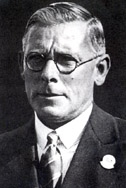
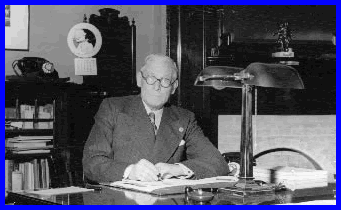
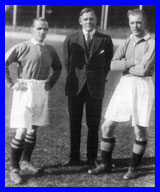
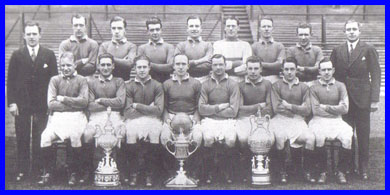
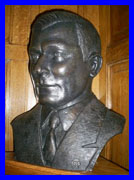
William "Bill" Struth, was born in Milnathort, Kinrossshire in 1875, although a stonemason by trade, he was well known, as a professional middle-distance runner. Although a very accomplished and skilled athlete, he was not above "improving" his chances when allowed to. He once told the story of how when competing in one particular race, he "accidentally" moved his handicap marker 5 yards down the track, and won the race. He then promptly collected and cashed the winners check, then left the town very quickly before anybody found out.
Trainer
His life as a professional athlete was very hard, but it did bring him to the attention of Hearts, who approached him to take up the post of Trainer at Tynecastle. This was a very welcome job offer, as the life of a professional was very hit and miss, and he had also lived much of his early life, in Edinburgh, close to Hearts Tynecastle ground. He spent a brief, but successful time at Hearts, and it was not long before his work at Hearts, was noticed by other clubs, and he received an offer from Clyde, to move through to Glasgow, and join them at Shawfield in 1907. The work he was doing at Clyde showed the makings of a true great, helping Clyde reach the 1910 and 1912 Scottish cup final, both of these games where funnily enough played at Ibrox. Although Clyde lost both these games, Struth's work had already been noted, by many, and by William Wilton in particular.
Such was his level of success at Clyde, that William Wilton approached Struth in 1910, about becoming trainer at Ibrox. Struth however was always a man of respect, and he refused the the job offer, due to his friendship with, and professional respect he held, for the long time Rangers trainer James Wilson. In 1914 James Wilson died, and once more Wilton approached Struth about coming to Ibrox, and this time he got his man, and Wilton brought Bill Struth to Ibrox, as his assistant.
World War 1
World War 1, devastated an entire generation with roughly 1,000,000 British soldiers dying during the conflict, and as such football to a back seat for the duration of it. At the very outbreak of the war, the SFA, cancelled the Scottish Cup for the duration of the war, but for some strange reason, the Scottish league tried to continue as normal. This decision was nothing short of farcical, as all of the players, and most of the fans, where required by law to either be in the forces, or work full time in war related industries, so for the duration of the war, professional football in Scotland became part time.
As Bill Struth, was considered to old to serve in a front line capacity, and his skills as a stonemason, athlete, and football trainer, where not considered essential war work, he along with the then Rangers manager William Wilton, both decided to volunteer their services as porters, to Bellahouston Army Hospital, which stood near Ibrox. Here Struth, who was now technically, part of the British army, helped care for injured soldiers, who had been brought home from the war. Both he and Wilton continued in this role, till the war ended in 1918. On the football front, the reduced pool of players rangers had to deal with, effected the league performance, only winning the league title once during the war, that being in 1918.
Manager
1920, saw William Struth, appointed as the second manager of Rangers, this came about in tragic circumstances, when William Wilton, the previous manager, sadly drowned in a boating accident, the day after Rangers had won the 1920 league title. To many clubs this would have been the end of an era, with the new manager, adopting a new approach, as to how the club should be run, but William Wilton had instilled in Bill Struth, what a great honor, it was to be associated with Rangers.
Struth like Wilton, was a strict disciplinarian, and made his mark on the players straight away.
He continued the principles of William Wilton, and instilled in his players the essentials punctuality, correct dress code, and also the need to have a proper diet. Coming from an athletics background, Struth knew how important proper diet, combined with proper training would be, these combined the skill of the players, would propel Rangers, to the complete dominance of Scottish football. As manager of Rangers, Struth had a few habbits, which these days might be considered strange, such as normal days training, begining with the players, walking a lap of the park, dressed in their suits, as they were told to "Breathe in deeply, lads!". The reason for this some what bizarre training schedule, was once said to be, that as an athlete, Bill Struth could spot any injuries a player may have, by just watching them walk. I do not know if this story is true or not, but it would make some sort of sense.
Struth also had a habit of playing the piano, which still stands in the Blue Room, after every match to unwind, but he also became known for some stranger habits, like feeding his pet canary, a nip of whisky everyday, and changing his suit, up to three times a day.
Discipline
No player at Rangers, during the Struth era, ever doubted who the boss was, William Struth was a strict disciplinarian, and a man, who believed firmly in respect for authority. To the dismay of many players, he demanded they wear a suit, collar, tie and bowler hats to training, instead of the common cloth cap. He believed that this gave the players the mentality, that they were important, and that they were part of something above simple entertainment. His obsession with the dress code, also extended into the dressing room. The importance of freshly washed and Ironed jerseys, along spotless white shorts, and correctly dimensioned stocking tops, were held in high regard. It is noticeable in 20's and 30's, that when ever Rangers took the field, all the players had their socks pulled up, and their jerseys tucked in to their shorts. This smart professional appearance and attitude was demanded from Struth, for when his Rangers team took to the field, they did so not only as ambassadors of Rangers, but also of Bill Struth himself.
Another part of the Struth legend has it, that the manager, would watch from the window of his house, at 193 Copland Road, as the players arrived on the underground for training. Anyone, who had dared to walk down the street, committing the serious crimes in his eyes, of having his hands in his pockets, or not wearing their bowler hat, would find that Mr Struth, had seen him, and had telephoned the ground, to insist that he walk down the street again, this time with his hands, by his sides, and their hat on their head.
If the players, were willing to accept the strict code of discipline, laid down by Struth, there where many privileges for them. They had the best of everything, restaurants, hotels, theatre and cinema seats, and Struth always insisted, that his teams traveled first class. Through this treatment, Struth made his players feel they were inferior to no one, and Bill Struth in one of his immaculate 3 piece tailored suit's, was at the very forefront of them. Any player however, who fell short of what Struth expected, felt the chill of being told, that his presence, was required up the marble staircase, in the manager's office.
Early Sucess
The disciplined regime that Struth brought to Ibrox paid off instantly, when Rangers won the league in his first year in charge, this was accompanied by the lord provosts cup as well. The following season Rangers lost the league, but won the Glasgow cup and the Charity cup, however the Scottish cup still remained elusive.
Rangers had lost the 1921 final to Partick Thistle 1-0, and the 1922 final against Morton, summed up Rangers luck in that tournament. After only 20 minutes, Rangers captain Andy Cunningham suffered a broken jaw, Struth was so concerned about Cunningham's health, that he decided to accompany him to hospital, putting his player's welfare before the cup final.
This was in the days before substitutes, so Rangers had to play the last 70 minutes with only 10 men. It is not surprising that Rangers would lose the cup final 1-0. Struth's Rangers team was by now starting to dominate Scottish football, and would win the league for the next 3 years, add this to another 3 Glasgow cups, and 2 charity cups, it was easy to see that the tide had well and truly turned, in favor of Rangers.
1926, brought a temporary, but shattering halt, to the run of sucess Rangers where having, when a injury hit Rangers team struggled in the league, finishing a very distant 6th (this is to date is our worst every league placing), and lost out in all the cups. Many people thought that Struth had run his course. The Rangers team that took the field in season 1926-27, was thought of by many people, as a spent force, and Bill Struth as a dead man walking. What they witnessed that year would dispel that myth, although Rangers yet again failed to win any of the cups, they did regain the league title from Celtic, and went into the new 1927-28 season, with high hopes.
The Hoodoo Busters
Season 1927-28, saw Rangers once again win the league title, scoring a remarkable 109 goals in the process, and capture the the Charity cup once more. But what this season extra special, for everyone at Rangers, was that we won the Scottish cup, for the first time in 25 years, and Bill Struth would win it for the first time.
After seeing off East Stirling, Cowdenbeath, Kings Park, Albion Rovers, and Hibs, Rangers faced Celtic in the final.
This set up an old firm final, the first since 1909. To many people this match was going to be to close to call. Rangers suffered a major injury crisis, when on the Thursday, before the final, club captain, Tommy Muirhead was ruled out of the final, due to injury.
The final itself was played at Hampden, in front of a then record crowd of 118,115.Celtic won the toss and kicked off, reports of the day say that Celtic controlled the first half, and where unlucky not to take the lead, when Pat Connolly shot, and looked to have scored, but somehow Rangers keeper Tommy Hamilton, kept the ball out of the net. The game completely changed in the second half, when on 55 minutes, a Jimmy Fleming shot, was handled on the goal line by Celtic captain Willie McStay. The Rangers players where adamant, that it was a goal, as the ball had already crossed the line, but the referee, said it had not, and awarded a penalty instead. McStay later admitted, that the ball had actually crossed the line, and today McStay's actions, would have seen him sent off, but this was not part of the rules, in the 1920's.
The man with the responsibility, of putting the penalty away, was Rangers stand in captain, Davie Meiklejohn.
As everybody held the breath, Meek ran up, and rifled the ball into the back of the net, and Rangers where 1-0 up.
This forced Celtic to come out and attack Rangers, and this played right into Rangers hands. Bob McPhail scored a second for Rangers on 66 minutes, and Sandy Archibald scored a third on 69 minutes. As the Rangers fans went wild with ecstasy, Sandy Archibald scored his second and Rangers fourth in 78 minutes.
The long wait was over, and the music hall jokes all stopped, Rangers had finally won the Scottish cup again.
The Grand Slam
This domination continued the following 1928-29 season, when Rangers once again won the league and the charity cup. This was only a warm up for the 1929-30 season. Rangers entered the 1929-30 season as favorites for the league title, but what Bill Struth's team did that year, went down in history. Rangers where to win every single competition (Reserves included), that they entered that year. The leauge, was won by a clear 5 points, from second place Motherwell. The highlights of the leauge season being beating Celtic both home and away
The Scottish cup, was the usual struggle, after seeing off Queens Park in the first round, the mighty Cowdenbeath held Rangers to a 2-2 draw at Ibrox, before they where beaten 3-0 in the replay, Motherwell Montrose and Hearts, where all dispatched on the way to the final, before Rangers beat Partick Thistle 2-1 in a replay to lift the cup.
The Rangers first team would also lift the Glasgow cup, beating Celtic 4-0 in the final after yet another replay, whilst Celtic where beaten again, in the final of the Charity cup, this time on the toss of a coin, following a 2-2 draw.
The sucess of the Rangers first team, was also matched by the Rangers reserve side, as they to where to win the the Scottish Alliance League, (The name used for the reserve league), and the Second 11 cup. When you also consider that Rangers where also to play and win 3 friendly that year, finishing the reason with a totally astounding combined record which read
P 91 W 70 L 8 D 13 GF 256 GA 77.
You can see why many at the time, belevied that this was the greatest ever Rangers team. Such was the domination of Bill Struth's Rangers team that year, that if Rangers, had entered Alan Morton in the Grand National, with Sandy Archibald on his back, they would probablly won that as well.
The Birth Of Celtic's Paranoia
The complete domination of Scottish football, by Bill Struth and his Rangers team, was such that many people started to wonder what was the secret of their sucess, Chief amongst them was long time Celtic manager, Willie Maley.
Maleys failure to match Struth, both on and off the park, would lead him to make various ludicrous comments to the press, questioning the impartiality of match officials, the Scottish league and the SFA.
Peter Liewell and Dr Doom's recent statments, are nothing compared to the ramblings, of this once great manager.
Maley's paranoid ramblings, and his search for excuses, reached an all time low, when in September 1931, following the tragic death of Celtic goalie John Thomson, following an accidental clash with Rangers player Sam English. When Maley was asked, what he thought of the incident, Maley would only reply with, "I hope it was an accident".
Even the current completley over the top level of paranoia, lies and bile spouted from Liewell and Doom, has not sunk to that level. Maley's complete failure to understand, never mind compete with Bill Struth, was perfectly demonstrated, when he said to Rangers legend, Bob McPhail, "That he could not understand, how someone with no background in football, could be so successful".
It was no secret what made Bill Struth, and his Rangers team so great, it was not the training or tactics of Struth, although these clearly helped the team, for long before the advent of sports scientists and physiologists, Struth had his Rangers team at the peak of physical and mental fitness, with a work ethic and attitude to match.
While it is true, that Willie Maley, had the best pre war record, of any club Scottish manager, he was unable to adapt to the post war football world.
This brave new football world, saw players turn truley professional, although most players before the war, had been professional, many had other outside interests, which took priority over the game. After the war, football became their main priority, with any business interests becoming secondary.
This change in player prioritys, was also mirrored in the managerial role, with the manager now completly running team affairs, where as before, the managers role, was effectivlly part of a commitee. This change in the managerial role, was perfectly suited to Struth, who was always his own boss, where as the move from a comittee structure, to a sole managership role, did not really suit Willie.
Headstone Photograph

Further Information
Firstname: RANGERS FOOTBALL MANAGER
LastName: WILLIAM STRUTH
Date of Death: 21st Sep 1956
Cemetery: Craigton
Berryknowes Road
Town: Glasgow
Region: Glasgow and Clyde Valley
Country: Scotland
Please Note, the marker on this map indicates the Cemetery location, not the location of a particular grave.
<< Back



